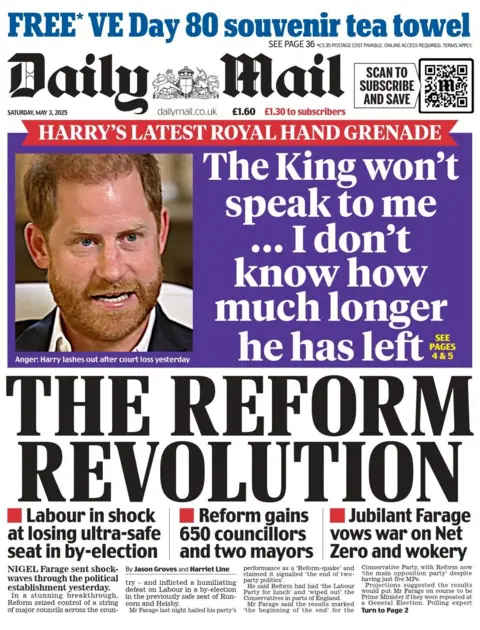As of May 3, 2025, political headlines across prominent British newspapers reveal a significant transformation within the political landscape, particularly emphasizing the rise of the Reform UK party under the leadership of Nigel Farage. Two central stories dominate the front pages: the performance of Reform UK in the local elections and an eye-catching interview featuring Prince Harry discussing his estranged relationship with the royal family amidst fears for his father, King Charles’s health.
The **Daily Mail** captures the essence of the moment, dubbing the situation as a “Reform revolution” that has sent shockwaves through the political establishment. It highlights that Farage’s party has achieved a formidable gain of 650 councillors and two mayors, marking a considerable triumph in local elections. Concurrently, the Mail conveys a poignant assertion from Prince Harry who laments, “The King won’t speak to me… I don’t know how much longer he has left,” indicating the depths of the strained relations within the royal family.
In a similar vein, **The Times** echoes this political shift, reporting that Farage has turned the tables on detractors who belittled his aspirations for Prime Minister, asserting that they “are not laughing now.” Farage characterized the recent election victories as a “reformquake.” British Prime Minister Sir Keir Starmer acknowledges the discontent among voters who feel disconnected from the advantages of his leadership, although he rebuffs Farage’s promises as “easy solutions,” resolutely insisting on avoiding “ideological zealotry.” This report also dives into Harry’s insights on his legal battles regarding security in Britain, revealing that his family’s visits to the UK seem “unlikely,” which fills him with melancholy about his children, Archie and Lilibet, not seeing their “homeland.”
Moreover, the **Daily Telegraph** accentuates the gripping moment from the local elections by depicting Farage’s jubilant reaction to tight victories in Runcorn and Helsby, showcasing him holding six fingers — the margin by which his party triumphed. The Telegraph’s coverage is complemented by remarks from Conservative leader Kemi Badenoch, who highlights the election results as disastrous for her party. On royal affairs, a mention of Prince Harry’s wish to “heal (the) rift with my father” pervades the top of the page, touching upon the ongoing familial discord.
Additionally, as further details unfold, the **i Weekend** emphasizes the bold promises made by Reform UK regarding local authority spending cuts and the elimination of diversity roles. The article accounts for the frustrations voiced by Labour MPs, including Emma Lewell, about the government’s declining support, attributed to punitive measures regarding winter fuel cuts.
Further, **The Financial Times** chooses not to feature the royal narratives, focusing instead on the implications of Reform UK’s emerging identity as a “populist insurgency” akin to movements in the United States and Europe. Citing a Conservative MP’s description of the results as “an existential challenge” for Badenoch, the tone suggests an impending reevaluation of party leadership dynamics.
A stark representation of the royal family’s turmoil is portrayed in tabloids like **The Sun**, which highlights Harry’s explosive remarks, characterizing them as an “incendiary attack” on his family. The **Daily Mirror** corroborates this narrative with the headline “Dad won’t talk to me,” emphasizing Harry’s concerns regarding his father’s health, stating, “I don’t know how much longer my father has.” The **Daily Express** and **Daily Star** amplify these sentiments, suggesting Harry’s portrayal of himself as a victim further exacerbates the public’s intrigue.
As the UK’s political direction hangs in the balance with the ascendance of far-right ideologies, contemporaneous revelations from the royal household keep the public engaged. The amalgamation of these narratives emphasizes the intertwined destinies of the royal family and political parties amid a crucial electoral period.



